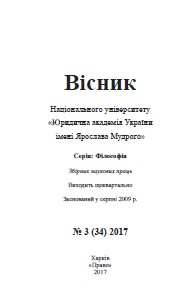ПРАВОСВІДОМІСТЬ ЯК ДЖЕРЕЛО ФОРМУВАННЯ ПРАВОВИХ СМИСЛІВ (ФЕНОМЕНОЛОГІЧНИЙ АСПЕКТ)
DECONSTRUCTION OF CALLIGRAM AND LEGAL FIELD (ANALYSIS OF STRUCTURAL DYNAMICS)
Author(s): I. Kovalenko, O. S. LozovaSubject(s): Philosophy of Law, Cognitive Psychology, Phenomenology
Published by: Національний юридичний університет імені Ярослава Мудрого
Keywords: social cognition; phenomenology of law; legal consciousness;
Summary/Abstract: The article uses the logic of phenomenological procedures. It involves the intentional analysis that allows you to explore the mechanism of occurrence of the phenomenon in consciousness. Intentional structures are implemented as structures of education make sense. The legal sense is understood as the intention of legal consciousness, as self-contradictory mental education. The article makes the assumption that the meaning of law is recognized their existence in law, which is the result of mapping different types of understanding of law and establishing the differences between them. It is shown that legal consciousness is always mediates social reality and provides all contact with her. Phenomenology allows to determine the legal consciousness as the essential characteristic of an entity, and specific mental process. In the article, intentional analysis and eidetic considered in constitutive aspects. The eidetic aspect allows to identify typical structure and describe the essential connection between them. The constitutive aspect is the establishment of sense of object, conditions of its formation and interpretation. The perception mechanism by legal consciousness of the facts of legal reality (a passive institutionalization) is shown in article; the producing new meanings (an active institutionalization) is defined; results of an institutionalization of the right as products of passive and active synthesis of legal consciousness are described. The analysis of konstitutivny activity of legal consciousness in two horizons – external and internal is carried out. The temporalnost as feature of synthetic activity of legal consciousness is considered. Communication of a temporalnost and intersubjektivnost is shown. Efficiency of the idea of a temporalnost of legal consciousness in theoretical and practical aspects is shown. Various products of active synthesis of legal consciousness in the ratio with results of passive synthesis are considered. The conclusion is drawn that the intentsionalny analysis and a phenomenological reduction give a new foreshortening of the description of the legal phenomena and allow to define legal life as process of transformation of earlier known legal meanings. It is suggested that legal life is constituted, generated by sense of justice from own bases, but isn’t defined by external factors.
Journal: Вісник НЮУ імені Ярослава Мудрого. Серія: Філософія, філософія права, політологія, соціологія
- Issue Year: 34/2017
- Issue No: 3
- Page Range: 81-97
- Page Count: 17
- Language: Ukrainian

